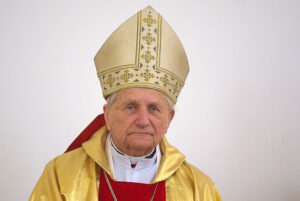
Cardinal Kazimierz Świątek during the Corpus Christi celebrations in Vitebsk, 11.06.2009 Autor: Serge Serebro, Vitebsk Popular News. Wikimedia Commons, licence: CC BY-SA 3.0
“How did you stay alive after going through all that…?”. This question, addressed to him by a KGB officer, basically describes his entire fate.
He was born on 21 October 1914 in Valga (Estonia) to a Polish family. Due to his Polish origin, after the outbreak of the Bolshevik revolution he was (together with his mother and younger brother) deported to Siberia at the age of only 3 years. He never met his father, a soldier of the Polish Legions, who was killed while defending Vilnius against the Bolsheviks. The Świątek family returned to Poland in 1922, after the conclusion of the Riga Treaty, which ended the Polish-Bolshevik War.
On 8 April 1939, he was ordained a priest and began his pastoral ministry in the parish of Prużana in Polesia.
A few months later, the Second World War broke out and Świątek became active in the underground organisation White Eagle, for which he was arrested by the NKVD on 20 April 1941. A Soviet court condemned him to death but, due to the outbreak of the German-Soviet war in June 1941, the sentence was not carried out. Until the end of the German occupation, Świątek remained in the parish in Pruzhany. In December 1944, when Polesia was once again in Soviet hands, he was arrested and sentenced to 10 years of hard labour camp and 5 years of deprivation of civil rights.
For two years he worked logging the Siberian taiga, and next he was sent to Vorkuta. From there, in 1947, for organising a Christmas Eve dinner, he was exiled to the Inta area, where he served the rest of his sentence. In 1954, he returned to Pruzhany, which became part of the Belarusian Soviet Socialist Republic as a result of the Yalta decisions. When the church in Pruzhany was turned into a club, he went to Pinsk.
On 13 April 1991, Pope John Paul II appointed him the Metropolitan Bishop of the Archdiocese of Minsk-Mohylev and the Apostolic Administrator of the Diocese of Pinsk. On 26 July 1994, he was elevated to the dignity of cardinal. He died on 21 July 2011 in Pinsk, where he was buried.



